Ep. 30 - M&A Horror Stories -- Special Halloween Episode
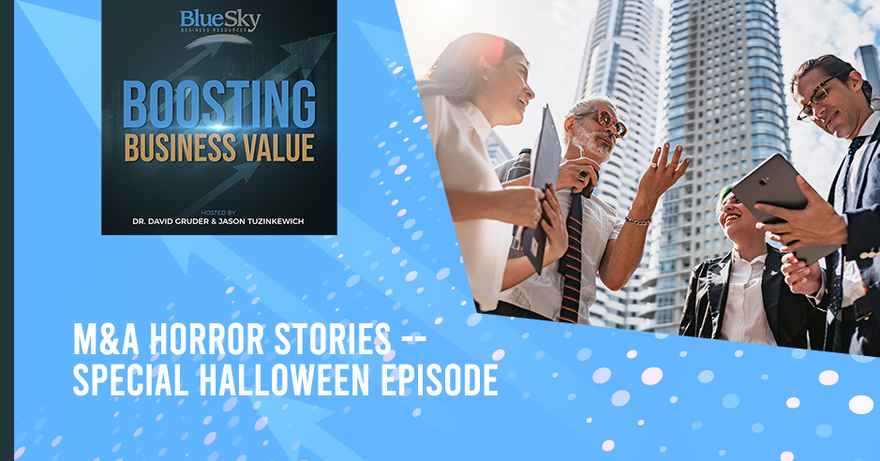
This is the first of what we expect will be annual Halloween episodes about horror stories from the world of mergers and acquisitions. In this installment, Blue Sky Business Resources CEO, Troy Tucker, joins us to share a couple of his horror stories, in addition to a couple from our very own Jason Tuzinkewich. The three of us offer key takeaways from each story that can prevent your business from becoming the next horror story. Join us and learn from these cautionary tales to make successful exits. Enjoy this M&A Horror Spooktacular!
---
Watch the episode here
Listen to the podcast here
M&A Horror Stories -- Special Halloween Episode
Frightful Stories About Business Exits Gone Bad And How To Avoid Becoming A M&A Zombie
We have a special, spooky, and fun episode prepared for you. The timing of this episode is prior to Halloween 2023. This is going to be about M&A nightmares. Joining us for this episode is Blue Sky’s Founder and CEO, Troy Tucker. Thanks for being with us, Troy.
Thanks for having me.
It's going to be scary when you get Troy on the line. We thought it'd be fun to have an annual recurring Halloween episode where we talk about the things that keep M&A advisors up at night with cold sweats and that could terrify a business owner as they start to consider going into an M&A exit transaction. A few disclaimers, these stories are true. Do not try them at home. All the names have been changed to protect the innocent and the guilty. With that, Doctor, take it away.
What we're going to do is share with you four horror stories. I'll be introducing each one with its title. The story will be told in a brief way and then the three of us are going to have a little mini-discussion about the story before moving on to the next one. That's how we're going to be doing this particular episode. We're going to start with a story that Jason's going to tell us called Kidnapping in the Midwest.
Thank you so much. What we're going to do is give you the story and then we'll all try to dissect it and give you some ideas of potential solutions and ways to mitigate the damage of these nightmare stories so that you don't end up where our protagonists end up. In this very first story, I was representing a company in the Midwest. It was a nice company. They had a nice growth trajectory and a good solid business. It had two owners. Good guys like them a lot.
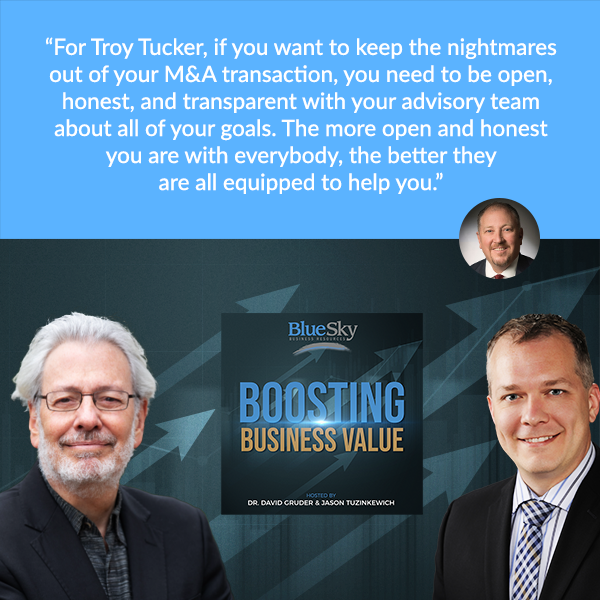
We found a great buyer and got into due diligence. We all like the terms. They were going to sell at a reasonable value. They had 30% of the transaction value held back in a seller's financing with a decent interest rate. All was going well. We cruised through due diligence. The financials looked fine and we negotiated the definitive agreement. Everybody was on the same page. We got into the last week of due diligence.
In the last week of due diligence, that's when the buyer starts to get to meet the staff that will be his new team. It was at this point that we realized there was a massive skeleton in the closet that the owners, the sellers, and my clients were trying desperately to keep out of my and the buyer's line of sight. This was a salesperson who was holding the deal hostage.
We talk a lot in Blue Sky about having key individuals and making sure that you secure a smooth sharing and transition of knowledge and relationships. This was one of those situations that is why we're so keen on this. This salesperson held 80% of the client relationships. Nobody else in the company knew these clients other than the sales rep. Consequently, the sales rep accounted for about 70% of the revenue generated by the company.
When our buyer met this sales rep, he informed them that he was planning on leaving and starting his competing operation. He was going to take his entire book of business with him. His reason for wanting to do that was because he felt like he had been slighted by the existing owners, the sellers. As you can imagine, this threw a massive grenade in the middle of what was a very smooth due diligence process to this point and threatened dramatically to destroy the deal, if not dramatically change the terms. This is among the more material findings that could come up in due diligence. Before I tell you the end of the story and what happened, let's talk about this whole hostage situation, gentlemen.
Troy, any thoughts on that?
You preached all the time about having continuity of your leadership team. It sounds like this person was high up on the leadership team. We also talk and preach about concentration and one person having too much ownership of any one part of a business because it does represent a significant risk. These things are things that Blue Sky has learned internally from lessons like these and trying to come up with creative solutions to fix that. Ideally, we could fix this up front but it sounds like the best possible outcome is what happened because it sounds like the deal still survived.
It was mortally injured at this point.
It sounds like the blood was flowing.
The blood was flowing and the bloodletting was going on. This is a great example of why it is harmful for any business to have anyone be indispensable. This is not to say we don't want our executives and our team members to be incredibly talented. What I mean by indispensable is they're holding secrets in a way where no succession is possible. Think for a moment what would have happened even if this wasn't a sale situation. It’s a situation where the business was sold where this salesperson suddenly got forbidden and died.
What would have happened to the business with the salesperson having a secret hold over the information about 70% or 80% of the client relationships? This is not healthy for a business. Healthy businesses make sure that they've got massively competent brilliant people in each role and that each of those people is being transparent and documenting enough. If the time does come when they're going to leave the company or God forbid, they should become ill and unable to perform, or even worse, die, the ball could be picked up because the information is available.
Healthy businesses make sure that they've got massively competent, brilliant people in each role.
This is crucial in an M&A situation because whenever there is a sale of a business, there's always going to be a percentage of personnel who have been with the business that no longer want to stay with it after it's sold. That happens and hopefully, it's not a lot of people. If a business is sold and the people who aren't going to be staying on haven't already built out the training or the information that whoever is going to take their place is going to need to have to hit the ground running, that's not a good thing for a healthy business or M&A transaction.
If you think about this from the perspective of the business owners who were my clients who were selling, they were already under the thumb of the salesperson because it would have been easy. Had the salesperson not had the desire or opportunity to start their competing business, they could have gone to a competitor, gotten a healthy signing bonus, and moved all those clients.
The owners were already at the mercy of the salesperson by allowing them to be the only point of contact for customers and excel in absentia. By that, I mean excel without bringing the rest of the team along. Finding those rock stars and having them mentor and train their level of excellence and their procedures for excelling can bring the whole team along and strengthen everybody.
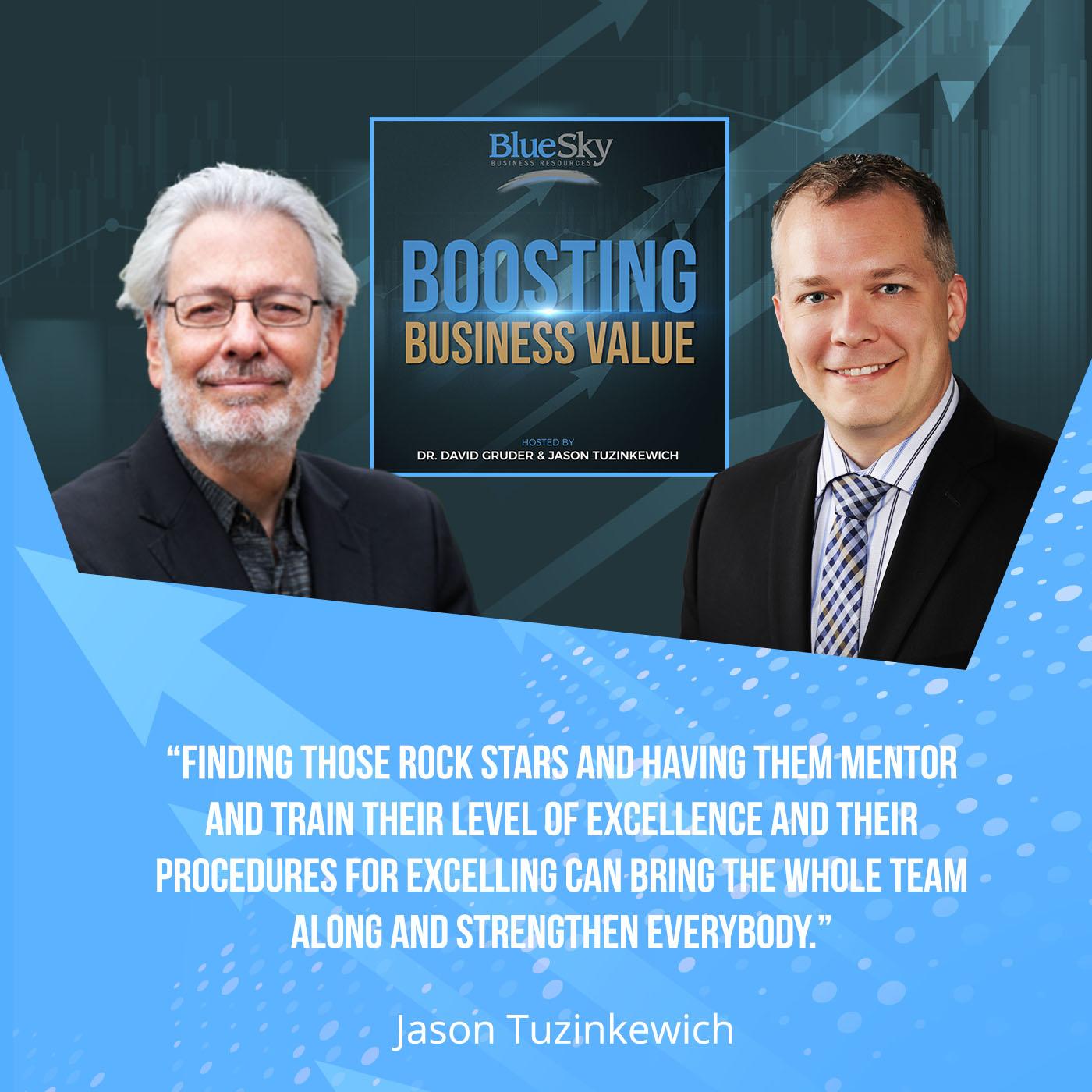
A long time ago, in a previous business that I ran, I learned the hard way that you can have one employee who can control your ship. You have to set boundaries and rules. I love the idea of teaching the excellence that person has to the rest of the team. If they leave or something terrible happens, as a business owner, you're sitting there holding this bag. You may or may not know what to do with it in the right steps to take.
Having multiple people that can do the same thing, you're not held hostage by anybody as something. I've had to face myself several times in the previous companies I've run. You can't allow that, even outside of an M&A transaction. In an M&A transaction, it's almost a death but even for your business, it's not a good business practice at all.
One last thing I want to say about this is as an advisor, I fell short for these clients was that I did not earn their trust enough to get them to open up and go ugly early with me. The advisory team is there to understand where all the skeletons are hidden to identify these issues and help you mitigate them upfront. Had all of this been brought up early, we could have resolved the situation with the salesperson well before going to market and this never would have been an issue.
On the business owner side, when you're looking at building an advisory team, don't bring on anybody you can't trust. If you're advisors reading this, recognize the fact that that trust has to be earned. Until you earn their trust, you're never going to get your clients to open up, go ugly early, and give you the full opportunity to support them that they need.
When you're looking at building an advisory team, don't bring on anybody you can't trust.
In the scenario you've outlined, Jason, the chances of earning that 30% of the value of the transaction are greatly diminished.
If that salesperson did quit after the deal, there's no business left. They'd be left with 20%-ish of their revenue and have to build back up. The ability to support the debt of the acquisition for the bank and the seller who's carrying that 30% note was potentially crippled. At the end of the day, this ended up costing my clients a ton of potential money because what we ended up doing was creating a structure where the salesperson got a substantial stay bonus for signing a contract to commit to staying for two years.
That was phase one but the buyer still felt like he was being fed a “crap sandwich.” We had to make them whole, too. The only way that we could do that and get this deal across the finish line was for the sellers to give up an additional 30% of their cash at the closing of the total transaction value. Only this time, it wasn't in the form of a seller's note. It was in the form of an urn out.
Not only did the company have to be able to cashflow the debt liability but they had to achieve metrics that were as good if not better than the historical performance that this business was valued against to receive the full allotment of their money. This put a tremendous amount of risk on the laps of the sellers, not to mention the additional cash that they lost in paying out this stay bonus to the salesperson. We got the deal done but it became very expensive for my clients.
We'll move on to Is Your Ship Sinking? Troy, here's your horror story.
It was a salty day on the sea. The sears will be pierced. This was a great deal. The owner had gotten everything they'd wanted. There are two guys. There was a financial owner and partner that was back in the owner. There was the owner who ran the day-to-day operations. This owner had always wanted to give his employees equity in the company. We had a range for that in a cell. He's mad at customizing the real estate value and the business value at the cell.
In the ninth hour, we learned that the buyer’s representative for the debt portion of the deal, the broker had suffered personal problems with his family. Information wasn't going back and forth between the broker and the bank. We had a get-together meeting with everybody. The day-to-day operator looked at the banker and said, “Are you going to get this deal done in 30 days?” The banker is like, “I can't get it done in 30 days. We've still got to go through the SBA process but we can get this done in 45 to 60 days. That's my commandment.”
The guy had a vein in the middle of his forehead and his face went red. He goes, “That's it. I'm out. This deal is done.” He walks out of the negotiation. The financial guy was still sitting there. We talked for quite a while. I was able to talk some sense into his partner. We're all sitting there holding the bag and the guy was like, “I'll talk to him and see if we can't put this back together.” The deal was dead at that point in time.
I got a call around 5:00 at night and it was the financial backer. He calls me up and says, “Can you come down to the office? I'm sitting here talking. We need to talk with you about this deal.” I go down there. The day-to-day operator had gone to his office and probably sat there and cried the entire afternoon. I could see the emotional drain on this gentleman. That led us to believe that we needed to bring in Dr. David Gruder to our team to help us work with these buyers.
We were able to talk common sense into him. He did go through with the deal but valuable lessons were learned. This wasn't a hostage deal or anything like that but it was an emotional struggle and turmoil. At the end of the day, it did close the employees and got a 10% ownership in the deal. The guy was cashed out. Thank God, because a month later, he found out that he closed the deal and he had a massive brain tumor. He could spend the time focusing on his health and getting back to being a healthy man again.
It's like six nightmares rolled up in one. I told you it’d get scary.
You didn’t even know it.
We bring Troy on board and it gets scary fast.
One of the many things that the story illuminates is how inevitably strong emotions are going to come up around the sale and acquisition of a business. They can't come up because people have invested years, often decades, in birthing a baby. In this case, the baby is the business, growing it up and putting in their blood, sweat, tears, heart, and soul into the business's success.
The almost inevitable result of that is that owners end up building their sense of self around the business and separating from the business. Even if the opportunity to sell is lucrative, it still has a high chance of being traumatic because the owner won't know who they are after the business is sold unless they're working with someone who can help them craft such an exciting next-life chapter that they won't undermine the sale of the business unintentionally.
The other thing that I like about this story, as nightmarish as it is, is we do talk a lot about this ego separation between the owner of the business and the creation of an identity and a life plan separate from the business for the owner. What this story highlights that we don't talk enough about is the emotional attachment to the staff as a family.
You can see that this financing and backing delay is not just frustrating the owner because he has to own the business longer but also frustrating the owner because of this undercurrent of, “I made this promise to my staff that they were going to get some money. I have to go back and explain to them that I misspoke and that bonus check for them is delayed.” That secondary emotional consideration is I identify with the business as an extension of myself. Many times, business owners also subsequently identify with the staff as an extension of their family. This is emotional on a lot of different levels.
I've heard many times from many different business owners how they want to take care of their employees. It's almost exclusive of the money they're going to earn at the closing. It's almost a secondary motivation the money is and taking care of their employees. I don't know how many times I've heard it. It is key in their thought process about what they're doing.
When I run into those scenarios, it reminds me of this story and the need for that plan afterward, a solid path forward during the M&A transaction, knowing where things are at any point in time. That was the other double whammy. Nobody knew about the guy and what he was not doing or doing incorrectly. It was all night dower. I could see where he thought he had been bamboozled and lied to. He had it on many levels, to be honest with you. It was a lie of attrition because nobody knew about it until we dug into it to find out what was going on.
A redundant and common point that almost every investment banker will resonate with is there is almost always some element of a dead zone and communication during due diligence. It's paramount that the advisory team identify. It's funny because it's hard to notice the sounds that aren't happening. Keep a keen eye on where it is quiet in this due diligence process because that's where you have to spend as much attention as where it's loud and hostile. It brings up that great point. I appreciate this story for highlighting all these things.

We were purposely withheld from talking to the broker by the buyers. They wanted to keep their information close to the best. In hindsight, I was blind-sighted by it but I should have been out in front of it as the advisor way more proactively than I was. When you're left sitting there looking, all the dominoes have fallen over on the table. It's like, “Which one of these do we get to pick up? How do we get the stack put back in place and move forward with this deal?”
This is where the kidnapping story and the sinking ship story start to overlap. Whenever a member of the transaction is getting koi, secretive, or highlighting something they don't want to talk about or address, that's when there's something underneath that we need to understand. For me and the kidnapping story, they didn't want the buyer to meet the staff, have any staff introductions, or any of that until after closing. It's a big red flag. In your case, Troy, the buyer wants to keep everything close to the best. There's nobody on the seller's team that they'll provide access to. It's another scary issue.
The only way I got to the bottom was by camping out at the actual banker's office until I got to the bottom of what was going on.
Are there any other things that you want to say about the lessons from this or the outcome?
The big thing here is establishing trust in your rapport, not only with the seller and the buyer but the advisory teams that are working on the deal. We have to have a little bit of lines of communication. We've taken steps at Blue Sky to make sure we're on top of that. We collect this information up front and we start our initial process. Anybody, as an investment banker, that isn't doing that is setting themselves up for a scenario exactly like this down the road.
We're going to switch gears with the next story, which is the lethal impact of withholding information. This story is called Lethal Advice. It’s the lethal impact of bad advice. Take it away, Jason.
I don't think Troy could have set me up any better with his segue. This is a perfect follow-on story. This is a story about not having the trust, input, and inclusion of the full advisory team. This is one where I missed a key advisor in the deal process. By failing to include that advisor, I opened up the door for him to circumvent the entire deal team and talk directly to the business owner, who was my client who was selling his business, and talk them out of the deal.
In this case, we had a banker. The banking institution and the business banker represented this particular business for two generations. We have a seller who is motivated to sell because he has health issues but was talked out of the deal by the banker playing on his emotions and telling him that he was being a fool and was being taken advantage of by myself and the advisory team who were in his estimation chasing a success fee and not looking out for his interests.
This banker was so well trusted by my business owner and his father, who was still alive and remembered the beginnings of their banking relationship. I lost every opportunity to even come back and discuss the concerns and address the allegations that were made against our team. This deal blew up exactly one week before the closing date. In this case, it was a banker but for most of my life, it's been the attorney.
A couple of times, it's been the accountant. 2 or 3 times, it's been the financial advisor. There is often going to be an advisor that's more trusted and that has a longer history with the business owner than a transaction advisor does. If they're not being heard and the transaction advisor doesn't understand and has a plan to address the concerns that they carry about a transaction, you're setting yourself up for rot within the process and an extraordinarily high risk of the explosion or implosion of a deal.
It reminds me of all the stories that can go that way. There's a bunch that happened like that word. One person on the advisory team, I'm thinking specifically of a buy-side deal. We were working. The accountant came in and disagreed with our valuation of what the target company was. I ignored the signals that the buyer wasn't comfortable with the business. When we argued that the business was worth more money, we were going to insult the seller by taking an offer this low to them.
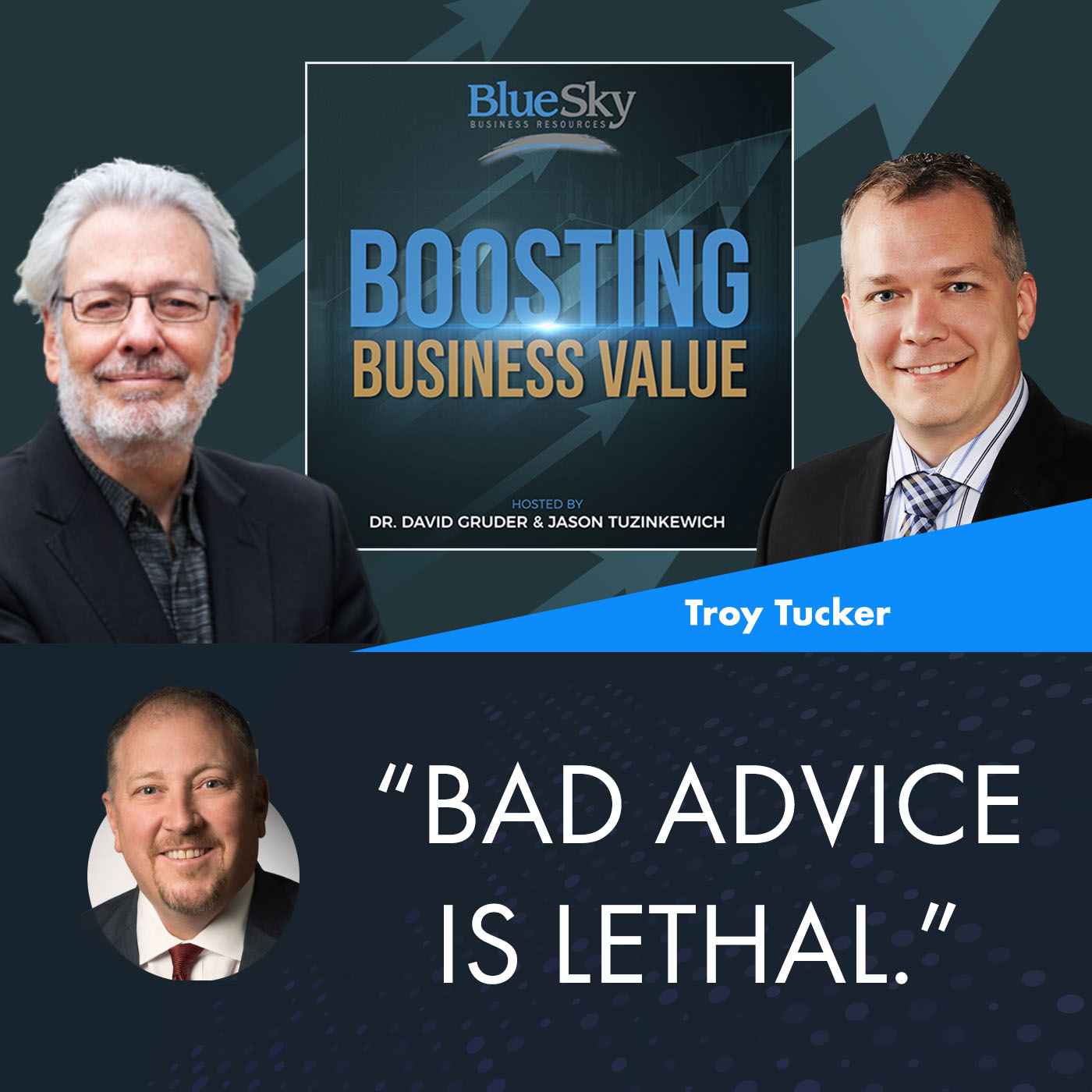
The whole deal blew up but it was one advisor that carried more weight than everybody else at the table. The seller wanted to get a deal so he wanted that lower price to start with. Bad advice is lethal and that deal never happened. I hope we were able to salvage the relationship with the seller but I'm not sure of that.
You bring up such an exceptional point, Troy. The bad advice that kills deals almost always plays into the desire or the insecurity of our client. In my case, this was a guy who was in a small town and he had a reputation. He didn't want to be taken for a fool. The banker was able to play on that fear of being taken advantage of and change his mind about the entire transaction. In your case, it was this desire to get a good deal. They worried that our recommendation of a higher price was that he needed money on the table rather than the target, which played into their emotions.

This is a story that goes to a couple of key pieces having to do with advisors who aren't adhering to the fiduciary standard in working with our clients where they're making their self-interest or agenda more important than their clients' highest interests. What often a company lacks fiduciary standards is this back channel and self-serving advice.
Giving private input to the seller or the buyer outside of the conversation among all of the advisors, especially the transaction facilitator undermines the M&A process. We see this backstabbing, gossiping power play throughout society. We see it in politics and families. It should be no surprise that it shows up in businesses as well. To not be aware that it can show up and not take steps to minimize the chances that it will happen is a big mistake.
I got back you up for a minute, Doctor because normally, you and I are pretty much on the same page. We pretty regularly agree with one another. I'm struggling with this idea. Are you telling me that there's backstabbing and deceit in politics? Where did that come from?
That doesn't seem possible. You never see that on the news or hear about that anywhere. That doesn't happen.
That's only left field, Doctor. I'm going to have to retract that one.
I stand corrected. Are we done with that third story?
We are. That one's dead.
Lethal advice killed it. Onto the final story, which is called Burnt at the Table. The subtitle would be Liar, Liar, Pants on Fire. Take it away, Troy.
I was working with a gentleman and he was the third-generation owner of a company that was over 100 years old. When I met him, I realized that he was a third generation. I knew he had a family. I'm like, “Isn't one of your children teed up to take over this business?” He was like, “No, they want to do their things. They've got families and are in their 40s. None of them ever showed any interest in it.” I took him at his word on that. We work through the deal. I worked diligently for almost 9 months or 10 months before I got him a full-price offer on what we agreed was the value of this company.
He started getting cold feet as this LOI and all the documentation were produced. He called me up one day and told me, “I don't have faith that they're going to be able to get the deal done. I don't know that I'm ready to sell my business yet.” I'm like, “What's going on? I can assure you that I've seen the financials. I've talked to the banker. The banker is in line for this deal. Everything's done. All of the Ts have been crossed. The I’s are dotted. This deal is ready to go. It's more than a fair deal where we're getting the value that you wanted and we agreed upon up front.” He told me, “Troy, at the end of the day, I can't do this deal. I’m not going to do this deal.”
The deal went south. I thought about all the missteps that I had taken, perhaps, and what I could have done differently. I was down there doing something. It was a meat processing plant. I was picking up some steaks. There was a new gal in the office. I introduced myself and she introduced herself to me as the daughter. I said, “Great. You're working in your dad's business.” She goes, “No, I'm running the business.”
That could have been helpful information right up front because we could have organized, structured the deal, set it up, and sold it to her instead, but he didn't tell me on purpose what was going on. I don't know how to get around that scenario at all. That one still haunts me. I don't know how to go about that. Blue Sky was into this deal for nine months. We're contingency on success fees at that point, and we still are. Our deals are always contingent upon success fees.
I had spent months doing this so I had to come home and have an unpleasant conversation with my wife about this and figure out a better path forward for Blue Sky. I try to figure out the lessons learned from this deal. When you get right down to it, people are motivated by their self-interest. They're always more motivated about family. If he'd have been honest with me about his daughter coming back into the picture we could work out a deal.
Two things brought up in my mind that get me in the cold sweats at night. One is for whatever reason, business owners don't like to pay advisors. They feel like an advisor getting money from them is in some way stealing. Doctor, you could probably talk about the psychology of this because I'm not sure how to deal with that.
The other one is that they also have a different perception of what selling their business for a success fee looks like. If they sell to an outside party, it's obvious. We facilitated that introduction and we then should get paid for it. Once they're selling to a family member, their management team, or something internal, then all of a sudden, they don't think of that as a sale that deserves a fee in the way that they would with an external party. Many times, they get bad structures and deals because they want to cut out the advisor when they need them the most to try to avoid this fee.
You're illuminating something about, in the broader sense, how many businesses are reluctant to invest in training in soft skills. They will invest in machinery, technology, and better sources of ingredients if they're selling products. There's this second-class citizenship mentality around advisors and people skills. In a sense, it's the opposite of what it needs to be because, in the end, it's the people, relationships, collaboration, and productivity that make a business far more than what the business is selling.
It's the people, relationships, collaboration, and productivity that make a business far more than what the business is selling.
This reluctance to invest in advisors is partly related to the second-class citizenship of soft skills but it's also partly related to one of the reasons why that's the case, which is that a lot of business owners have never been taught how to select high-quality advisors and personnel development programs. If they don't know how to select those resources, then they're going to be gun-shy for understandable reasons.
You bring up a great point about selection because there are bad actors out there. There are people out there in the world providing services that justify business owners' weariness of our advisory professions. On the one hand, we're fighting ourselves in this battle but on the other hand, if they are competent in recognizing their need and selecting a good team, it goes back to that whole thing, “Only higher advisors you can trust and have advisors that are willing to earn that trust.” Getting the awareness to be able to differentiate the bad actors from the good by the fruits of their labor, there's an opportunity to bridge this gap.
It ties into the last story too with lethal advice or having advisors around you that are pointing that advice. There's one other point that's missing and that hasn't been talked about here, which is the risk that the dad assumed with the daughter. He had told me stories about his daughter and the financial struggles that she was having, which is why he didn't think she was a good candidate to start with.
He's also left holding the financial bag. There wasn't the peace of mind to go sit on his boat and enjoy the sunsets with his wife because he still got revenue, income, family values, and family pride on the line. This is a 120-year-old company. He's handed it to a person who doesn't have the financial wherewithal to withstand any storm, which means he's backing that 100% forever.
How many times do you hear that in an M&A transaction? You get brought into it and you say, “Why aren't you thinking about selling to your family?” The immediate answer at that point when the pressure is not on is, “I don't trust that they can run this company.” All of a sudden, over time, they get worn down and get emotional about truly letting go. They're like, “I don't have to fully let go if I give it to my kid.” All of a sudden, they start talking themselves out of the rational decision that they made when they hired an intermediary.
One of our friends in Colorado did the same thing. At the ninth hour, he handed it down to a son. I don't know how many conversations we had with him about not trusting that a son could do it. We had met the gentleman many times. He was a creative guy and smart but I don't know that he had the wherewithal to run a business. He'd make a hell of a salesperson for anybody but running a company is a whole different stretch.
I'm thinking about a family-owned business that I was a consultant to quite a few years ago. These two brothers owned the business they had gotten from their father. They ideally wanted to have a succession plan so that their children could own the business but they had massive reservations about whether their children had the passion, chops, and willingness to learn that would be necessary for the business to continue to thrive.
It was only through exposing all of those secrets in a transparent and helpful way that it was able to became clear which of the children had the desire to take on the business and continue the business themselves and had the commitment to developing their capabilities to the point where they could do that well. It was not until that became clear that all the don't talk rules were broken. The two brothers reached a point where they felt settled, comfortable, and trusting that this succession plan that they wanted to happen could happen in a good way.
Those stories can go on and on forever. I've got a million thoughts running through my head about scenarios I could bring up but at the end of the day, you do have to have those open conversations and figure out what is best for the company and the family. That relationship amongst the family has to continuously be managed. Jealousy could creep in or somebody thinks somebody's getting treated more favorably than the rest of the family. That could lead to the demise of the business as well, David. That's where you come into play in spades.

One of the things that is precious about Blue Sky’s approach is that Blue Sky understands that one of the advisory teams among all of the advisory teams that are necessary when succession or exit is being looked at in whatever form it's being looked at is the family becomes an advisory team as well so these hidden things can get exposed. When you were talking, Troy, about not being sure what the remedy is, that's the remedy. The family needs to be its advisory team.
That put some squarely in the Gruder zone.
Is there anything else you want to say before you move on to sharing our takeaways and wrapping up the episode?
We’ve covered a lot of ground here.
Troy, it's been such a pleasure having you with us on this episode. Do you want to lead off with what the key takeaways are that you want our viewers and readers to take away from this episode?
If you want to keep the nightmares out of your M&A transaction, you need to be open, honest, and transparent with your advisory team about all of your goals. The more open and honest you are with everybody, the better we are all equipped to help you. It needs to be advice that's not offered in silos. It needs to be the entire advisory team working together on both sides. In deals, there's information that has to be kept siloed between buyers and sellers but at some point in time, you have to come together and work together for the transaction to get the transactions.
Established trust and full inclusion among all advisors, not only the transparency between the seller and the buyer.
That leads me right into what I was thinking because I was going to say the same thing. It's all about trust but this trust dynamic is bigger than we ever appreciate it to be. For a business owner and a potential client, that client has to build a team that they feel like they can trust but then every member of that team has to be committed to earning that trust every day and building the trust and respect amongst themselves as peers so that they are all moving in the same direction to provide the best possible guidance for their mutual client.
The last piece on this whole trust thing is if you are putting yourself as an advisor in that coach role, especially if you're the transaction intermediary in an M&A transaction, you have one extra responsibility beyond the trust, which is everybody knows to listen to what is said and what is happening but it's as important to pay attention. Every single one of these stories, in their own way, alludes to failures occurring because of a lack of attention to what's not being said and what's not happening. You listen for the noise and the quiet. You let everybody else deal with what's in the middle in a lot of ways and facilitate that piece.
If you don't, you end up in the horror movie Night of the Living Dead.
Hopefully, your boat doesn't sink.
While the tables are on fire.
One of the takeaways for me is that indispensability kills businesses and M&A. It's never too soon for each team member to be mindful of succession planning long before the exit is even being executed or implemented. To me, that is an important takeaway. Another is there's an old saying in Twelve-Step programs like Alcoholics Anonymous, “We're only as sick as our secrets.” The same is true in businesses.
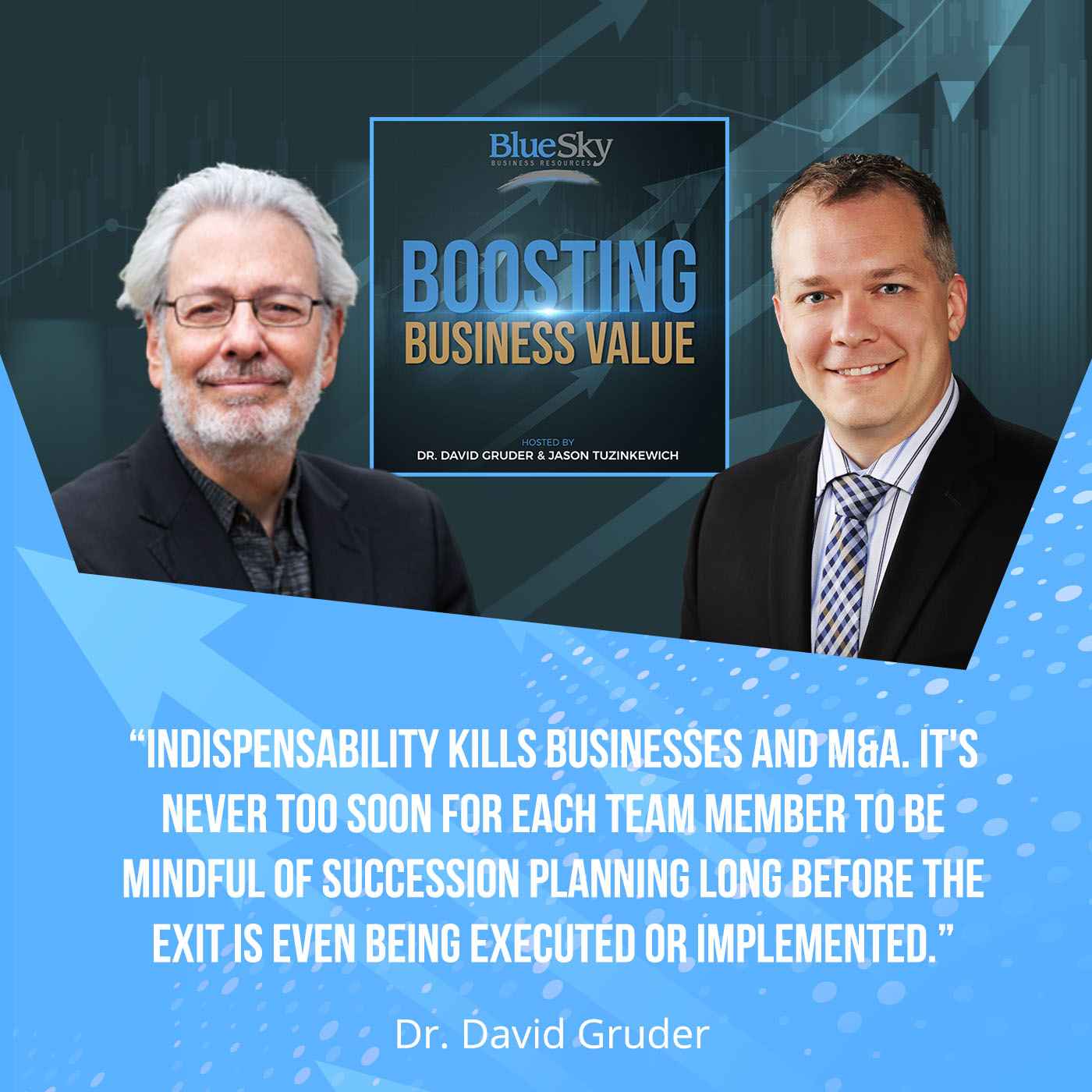
M&A is only as sick as its secrets. Always be transparent about your skeletons if you're a business owner. With your M&A, it's a perfect sound bite from this episode. Jason, you said, “Go ugly early.” Think about it at the level of real estate transactions. If a seller does not disclose a defect in a house and the sale goes through, and there's been withholding about that defect, the buyer has pathways for devastating recourse against the seller.
This is no different. We are as sick as our secrets. Sellers need to appreciate that every skeleton in the closet, no matter how big or small they think it might be, needs to be disclosed to the transaction advisor so that decisions in an open-eyed way can be made about what to repair so it doesn't need to be disclosed because it's been repaired, what needs to be disclosed because it's not yet been repaired, and how to disclose it in a good way that's not going to cause a deal to go south.
The third is what I was talking about this back-channeling of self-serving advice by non-fiduciary advisors that will every day of the week undermine sellers, buyers, and the M&A process. Lastly, to put a fine point on it, always include family members as a part of your advisory teams. Your family is one of the advisory teams.

Callbacks are real.
They're painful. With all of that said, I want you all to know that it's only 104 more episodes until our next nightmare story. Stay tuned for that. Readers, thank you so much for reading. I hope you had as much fun as we did. I hope this was enlightening for you, whether you're a business owner, business member, or an advisor. On behalf of our special guest, Troy Tucker, Dr. David Gruder and myself thank you so much for taking part in this episode.
We'd love to have you click the subscribe button to help us get in front of more people. We'd also be very interested in hearing your comments and feedback. If you want more information about Blue Sky Business Resources or utilize our tools, even the free tools like the micro surveys that we have available to you, hit up our website at BlueSkyAdvisors.net. You can find our show there and free survey tools to give you strategic guidance throughout your business. You can learn more about our team and find an advisor that can help you out. We look forward to speaking with you again in the very near future. Thanks so much and have a great day.
Important Link
About Troy Tucker

Troy Tucker is the CEO of Blue Sky Business Resources. Fresh off the exit of his construction company, Troy realized that he wanted to use his lessons learned to help other entrepreneurs make successful exits from their own businesses. That decision happened on a sunny day with blue skies, and he called this his “blue sky dream.” A month later Troy was enrolled in a certification program with the America Business Brokers Association. Two years after that, he earned his CM&AP, and his Blue Sky dream became a reality.
Troy enjoys working with transitioning business owners and entrepreneurs, and their advisors, to ensure low drama, fruitfully successful, exits. He is a member of the American Business Brokers Association, International Business Brokers Association, and M&A Source. Recruiting and building an exceptional team is what he enjoys most about his job, in addition to working with great clients and professional service providers. His areas of speciality include sell-side engagements, and manufacturing, and construction are a couple of his industry specialties.
When Troy is not in the office, his Blue Sky co-workers have considered hanging a “Gone Golfing” sign on his door, because that is most likely where he is! Although Troy also loves skiing, hiking and traveling with his family, he also gets excited about hitting team targets and goals.


0 comments
Leave a comment
Please log in or register to post a comment